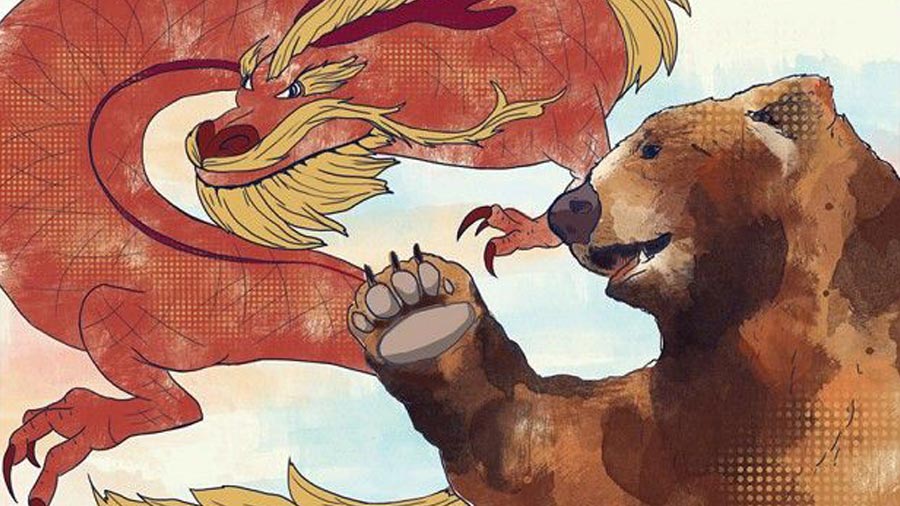Russia and China’s Positioning Within The Belt & Road, Shanghai Cooperation Organization & Eurasian Economic Union
Op/Ed by Jeff Schubert
China’s attitude to Russia has fluctuated in an important way over the last few years. While Russia has consistently wanted a formal relationship between the Eurasian Economic Union (EAEU) and the Belt and Road Initiative (BRI) as the main plank in a Greater Eurasian partnership, China’s initial preference was to distance itself from the EAEU relationship in favour of an expanded economic role for the security orientated Shanghai Cooperation Organization (SCO). But Russia rejected this because it would have meant individual EAEU countries which are also SCO members – for example Kazakhstan — having a status equal to itself in a relationship with China.
China then became less interested in the SCO as a result of the 2015 decision – after much Russian pestering related to its Greater Eurasia concept – to admit India and Pakistan. China agreed to this because it wanted to focus its efforts on the BRI. The BRI’s initial successes, particularly the May 2017 “Forum” which was attended by a large number of world leaders, gave China a boost in confidence and it seemed to increasingly feel that it did not really need the SCO or the EAEU.
In fact, China began to feel that it did not need anyone, including Russia – although Russia’s powerful position in Central Asia (and the energy rich Caspian Sea) meant that there was a logical qualification to any excesses.
However, more recent less clear BRI successes, a general backlash against some of China’s policies (eg Xinjiang, South China Sea), and the increasingly aggressive approach of the US to China – tariffs, foreign investment, Huawei, talk of more missiles aimed at China from bases in the region – led China in mid-2019 to accept more of Russia’s ideas on the nature of a closer relationship.Speaking at an early June 2019 meeting with Vladimir Putin, Xi Jinping said that he and Putin “agreed to continue our work on integrating the BRI with the EAEU. We will support each other in the BRI and the Greater Eurasia partnership”.
This a significant change by China, but it also risks signalling to Central Asian countries such as Kazakhstan (and Mongolia) that future relations with China are largely dependent on how Russia sees things. So, China will not go too far with this change in approach.Russia has consistently emphasised the economic aspects of the Greater Eurasian partnership idea, but there is no doubt that the increasingly bad relationship of both Russia and China with the US will lead to consideration of national security aspects.
Russia is not a natural ally of China, has its own fears about Chinese power, and the great majority of the Russian elite would prefer a closer relationship with the “West” both in political and economic terms. However, the US is now pushing extremely hard against both Russia and China and the dye is being recast at a furious pace. While Russia and China will never be allies in the sense of NATO they will intensify their mutual support and cooperation in a number of areas.
While Russia’s interests in East Asia will not always coincide with those of China, for example the bond with Vietnam, China will always be more important.While the US, with its powerful military and high level of economic independence is enjoying pushing its weight around, Western influenced countries such as Australia would do well to reflect on whether it wants to encourage the development of a region in which an occasion-specific China-Russia “bloc” goes toe-to-toe with the US – and possibly wins!
This article was written by Jeff Schubert, Professor of International Business, at the new Baikal School of BRICS, Irkutsk National Research Technical University. He was previously Visiting Professor, School of Asian Studies within the Higher School of Economics National Research University, Moscow. His book “The Eurasian Economic Union, One Belt One Road, and the Shanghai Cooperation Organization” can be down-loaded (for free) here
Silk Road Briefing will accept independent voices and opinion, and is the leading voice on China’s Belt & Road Initiative. If you have an article you’d like to submit please contact Adam Pitman, Managing Editor, at editor@asiabriefing.com
About Us
Silk Road Briefing is produced by Dezan Shira & Associates. The firm provides business intelligence, legal advisory, tax advisory and on-going legal, financial and business operational support to investors throughout China, India, ASEAN and Russia, and has 28 offices throughout the region. We also provide advice for Belt & Road project facilitation. To contact us please email silkroad@dezshira.com or visit us at www.dezshira.com






